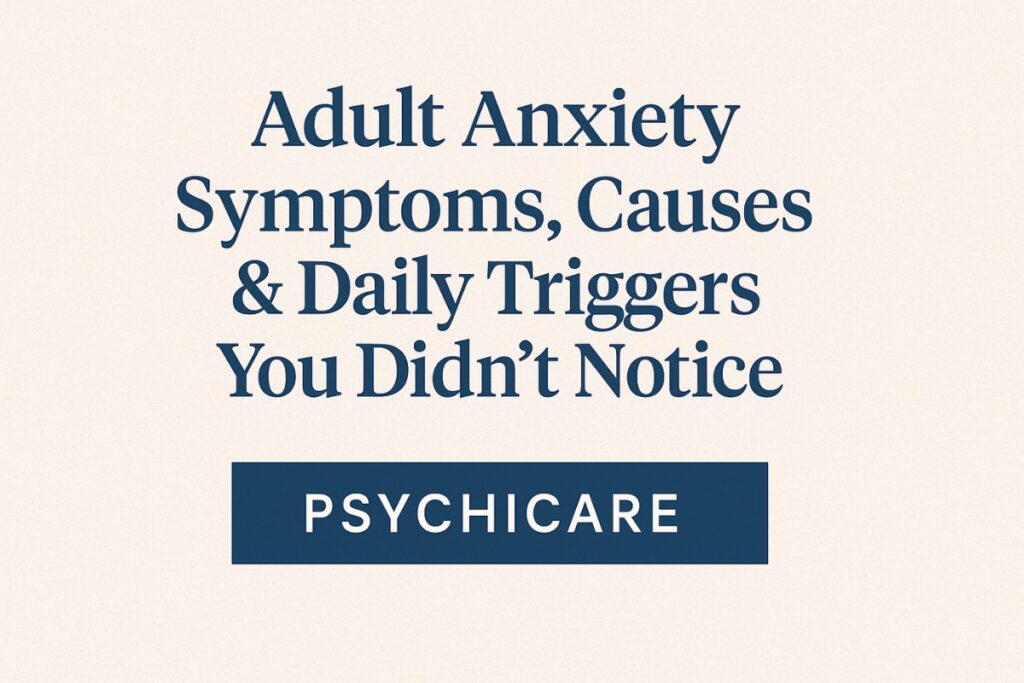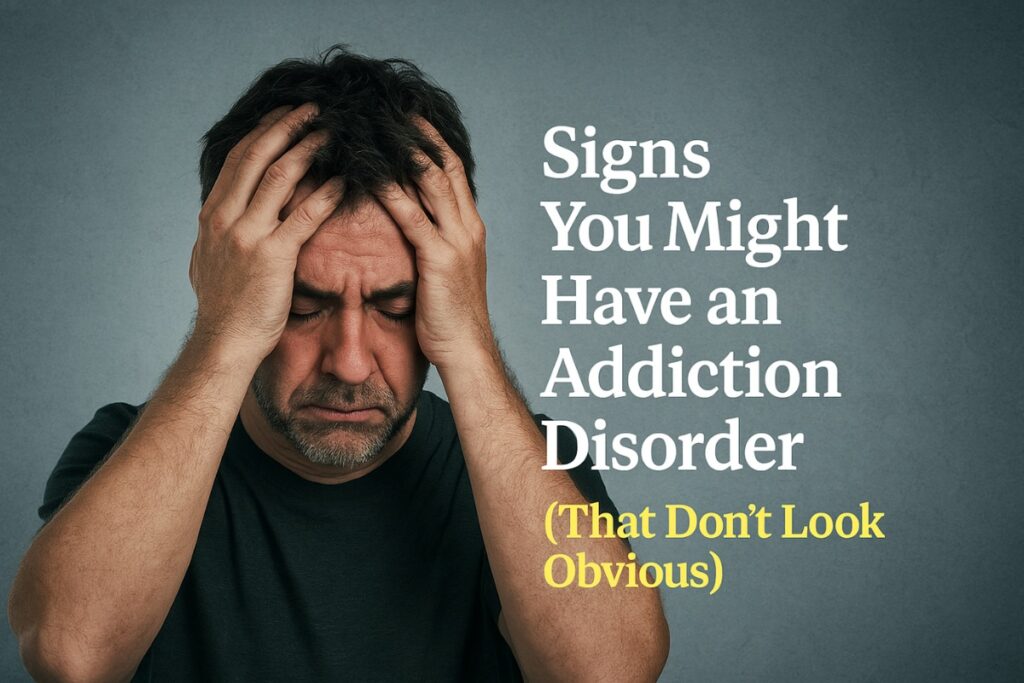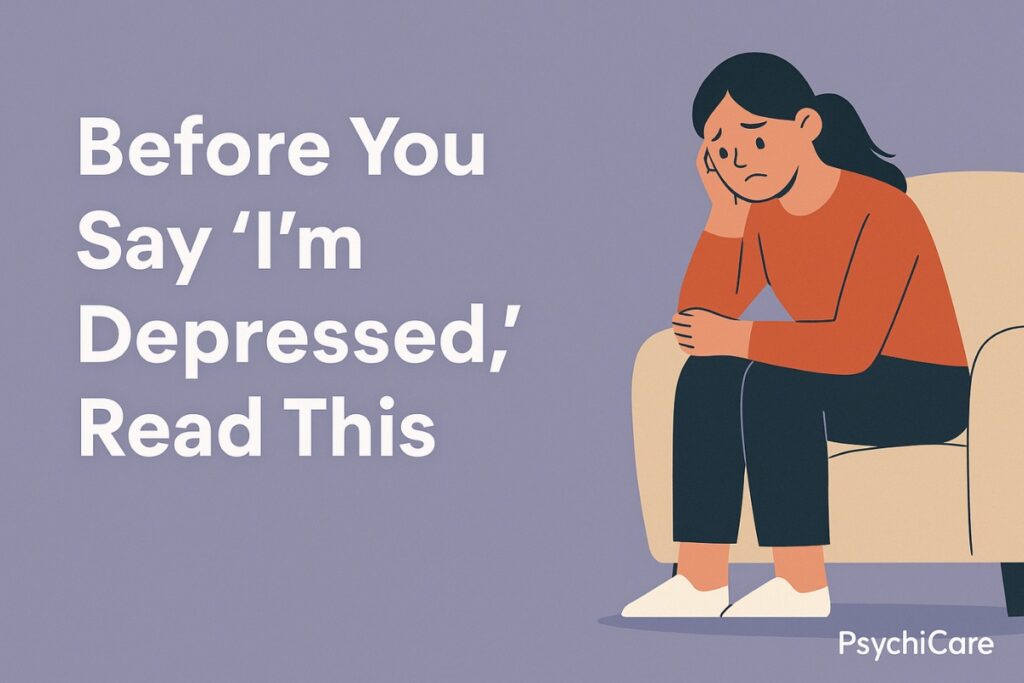You’re snappy with people you care about.
Your heart races before simple tasks.
You keep asking yourself, “Why am I like this?”
That’s adult anxiety, and it’s a lot more common than most people think.
Whether it shows up as overthinking, tightness in your chest, trouble sleeping, or avoiding people, anxiety can slowly take over your day-to-day life. Many adults don’t even realize what they’re dealing with until things start to fall apart in relationships, work, and health.
It’s not always panic attacks. Sometimes it’s adult ADHD with anxiety, or anxiety that started after childhood trauma. Sometimes it’s separation anxiety, social anxiety, or just a general feeling of being on edge all the time.
In this guide, we’ll break down:
- What adult anxiety actually looks like (not just what Google says)
- Why it happens even if you’ve “never had it before”
- What real tools and treatments help you get back control
If you’re tired of being stuck in your head, this is for you.
What Adult Anxiety Looks Like (Not Just Panic Attacks)
Adult anxiety doesn’t always show up as full-blown panic.
It’s often quieter and easier to miss.
You might notice:
- You avoid calls or cancel plans last-minute.
- Your mind won’t shut off, especially at night.
- You constantly scan for what might go wrong.
- You replay conversations and worry you said the wrong thing.
Some people feel it in their body:
stomach issues, tight chest, sore jaw, or shaky hands. Others feel it emotionally restless, disconnected, and angry for no clear reason.
And for many adults, it doesn’t even feel like anxiety.
It just feels like being exhausted all the time.
Common types of anxiety in adults:
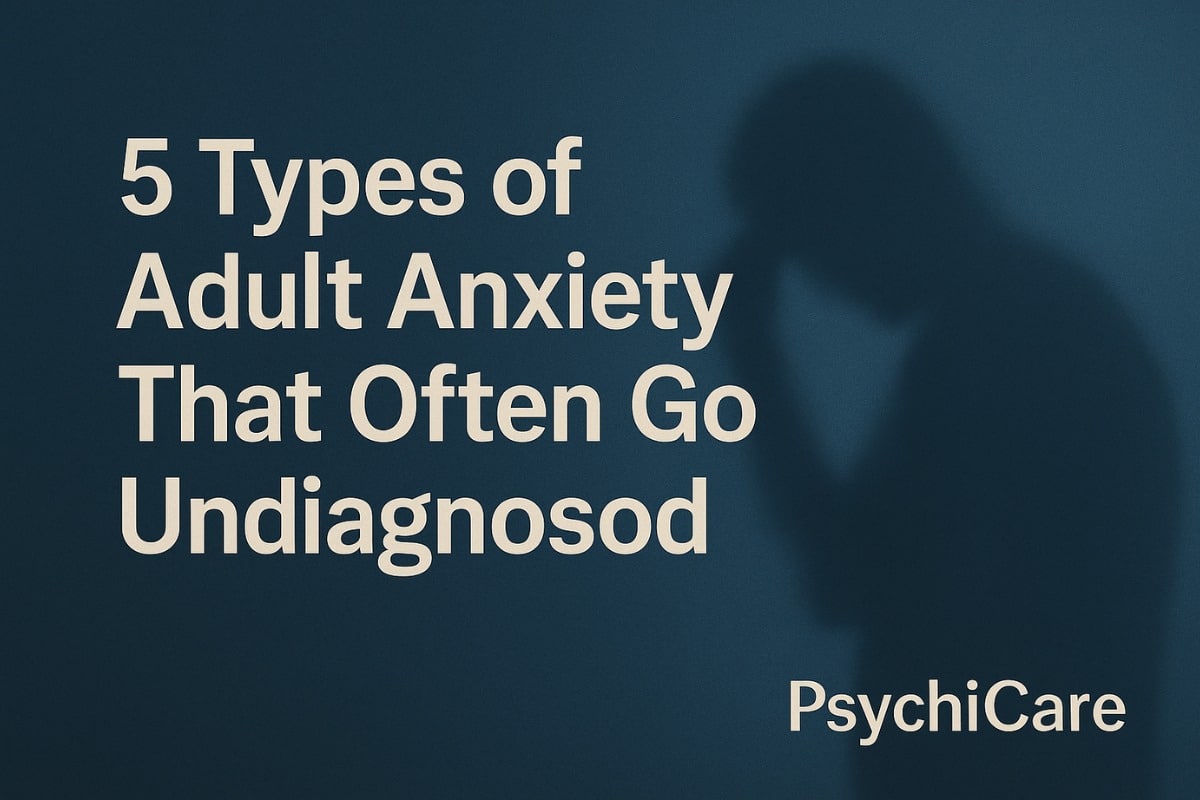
- Generalized Anxiety Disorder (GAD): Ongoing worry about daily life, money, work, health, relationships without a clear trigger.
- Adult Separation Anxiety: Fear of being away from a partner, parent, or child even in adulthood.
- Social Anxiety: Dreading social situations, overthinking interactions, or avoiding groups altogether.
- Panic Disorder: Sudden waves of intense fear, heart palpitations, and shortness of breath.
- Adult ADHD with Anxiety: Racing thoughts, impulsivity, and overwhelm that often get misdiagnosed or ignored.
You don’t have to check every box to be struggling.
Anxiety is personal, and in adults, it often hides behind being “high-functioning.”
10 Signs of Adult Anxiety You Might Be Ignoring
Adult anxiety doesn’t always scream. Sometimes, it whispers and you learn to live with it. But these are signs you shouldn’t overlook:
1. You can’t relax, even when nothing’s wrong.
You feel “on edge” all the time. Rest doesn’t feel restful.
2. You overthink every little thing.
From texts you sent to choices you made years ago, your brain won’t stop looping.
3. You avoid social situations (or obsess over them).
Either you cancel plans or spend hours rehearsing conversations in your head.
4. You feel tired, but wired.
Exhausted all day, but wide awake at night. Your nervous system won’t switch off.
5. You have random physical symptoms.
Tight chest, nausea, headaches, stomach aches but no medical cause.
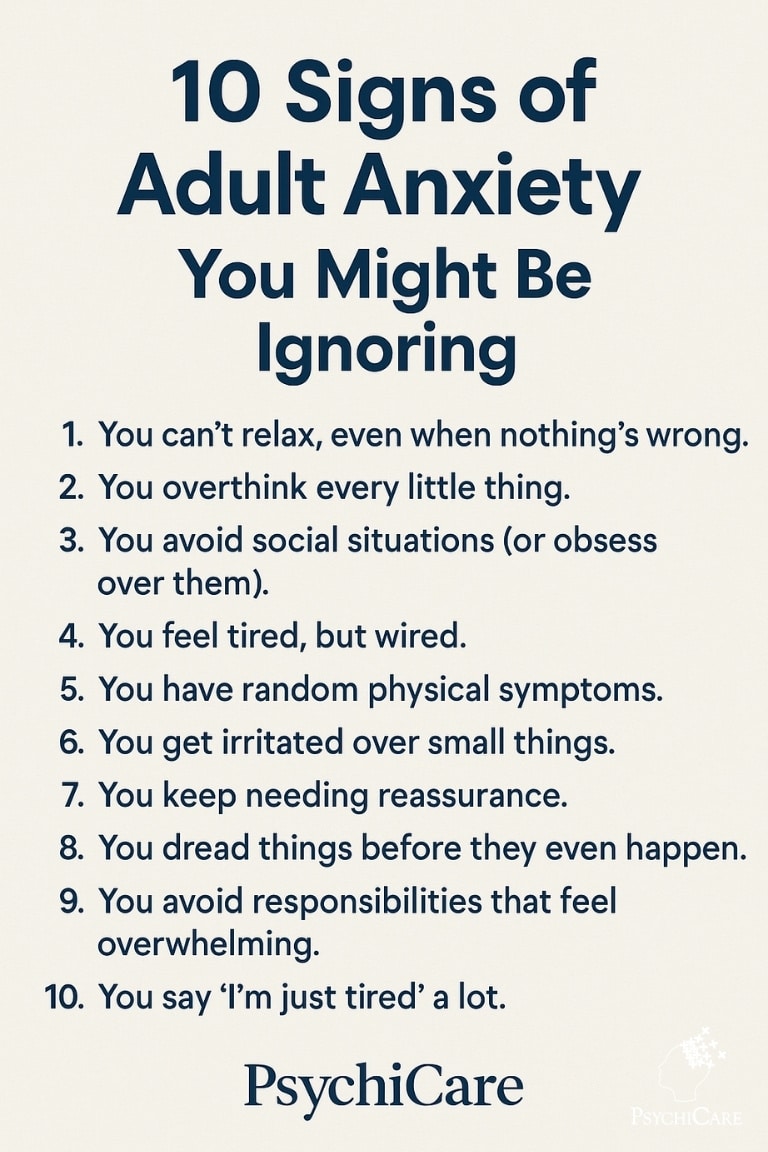
6. You get irritated over small things.
It’s not “just a mood.” Anxiety can make you emotionally reactive or short-tempered.
7. You keep needing reassurance.
Constantly checking in, rereading messages, or needing others to tell you “it’s okay.”
8. You dread things before they even happen.
Even normal plans or tasks make your heart race and thoughts spiral.
9. You avoid responsibilities that feel overwhelming.
Putting off emails, calls, or decisions because your brain feels flooded.
10. You say “I’m just tired” a lot.
Because saying “I feel anxious for no reason” is harder to explain.
10 Things That Can Cause Anxiety in Adulthood (That No One Talks About)
Adult anxiety doesn’t just come from “being stressed.” Often, it’s triggered by life experiences that build up silently over time. Here’s what might be fueling yours:
1. You never fully healed from childhood wounds
If you grew up with yelling, neglect, fear, or pressure, you may carry that emotional tension into adulthood, even if life seems “fine” now.
2. Your brain never gets a break from noise
Too much news, too many screens, and constant pings can leave your mind overstimulated and anxious 24/7.
3. Work feels like survival, not success
If you’re stuck in a toxic job, chasing impossible deadlines, or constantly worried about losing income, anxiety becomes a background hum.
4. You say yes when you want to say no
People-pleasing and ignoring your own needs can make you feel trapped, drained, and resentful, leading to anxiety that feels “unexplainable.”
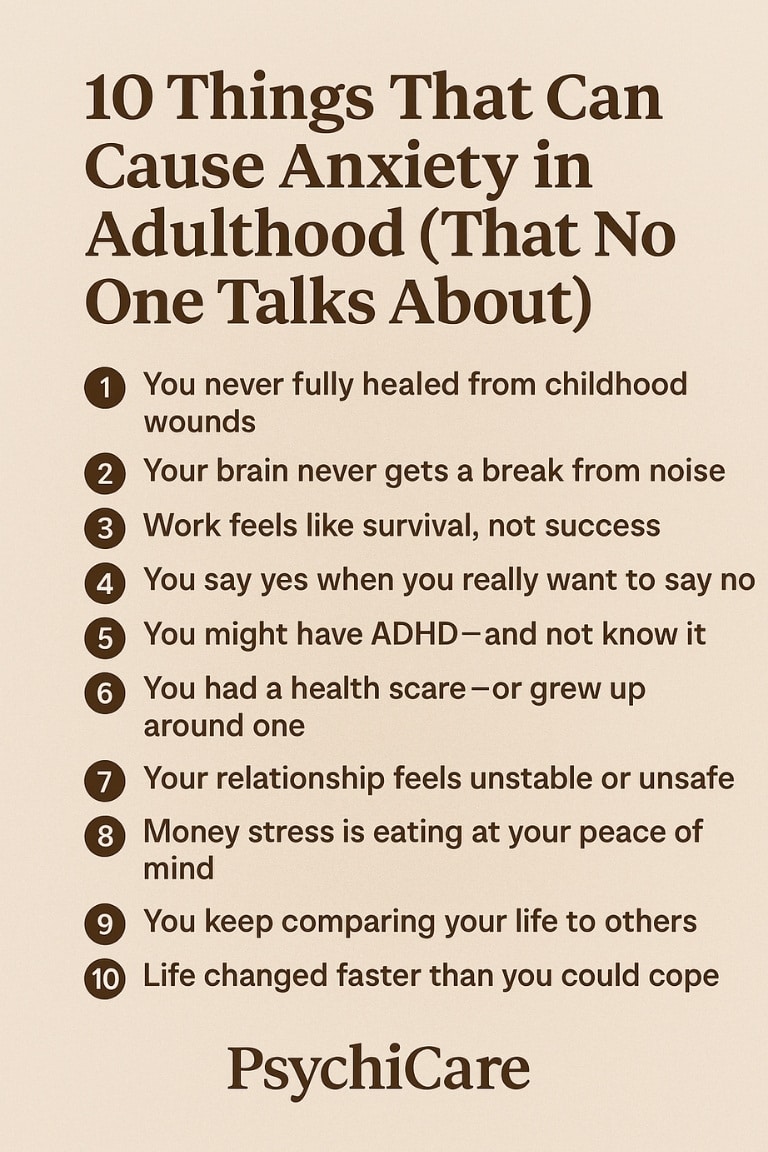
5. You might have ADHD and not know it
Many adults with undiagnosed ADHD experience chronic anxiety from overwhelm, forgetfulness, and the pressure to “act normal.”
6. You had a health scare, or grew up around one
If you’ve been through medical trauma (yours or someone else’s), even a mild symptom can send you into panic.
7. Your relationship feels unstable or unsafe
Fear of losing your partner, being cheated on, or never being “enough” can trigger anxious attachment patterns and emotional panic.
8. Money stress is eating at your peace of mind
Worrying about bills, debt, or the future can keep your brain in survival mode even if you never talk about it.
9. You keep comparing your life to others
Seeing people online “doing better” or hitting milestones can make you feel behind, stuck, or like you’re failing, fast track to anxiety.
10. Life changed faster than you could cope
Big shifts like becoming a parent, losing someone, moving cities, or getting divorced can shake your emotional foundation more than you expect.
Do I Have Anxiety? Tests & Self-Checks You Can Try Right Now
Wondering if what you’re feeling is just stress, or something more?
You’re not alone. Many adults spend years brushing off anxiety symptoms, thinking, “I’m just tired,” or “It’s probably nothing.” But recognizing it early can help you take back control before it gets worse.
Red Flags That Suggest It’s More Than Everyday Stress:
- You constantly feel tense, even during downtime
- Small tasks feel overwhelming or impossible
- Your mind spins with worst-case scenarios
- You avoid things you used to enjoy
- Physical symptoms (like nausea or insomnia) happen often
Online Screening Tools You Can Use Today:
These are not official diagnoses, but they can offer insight:
- GAD-7 (Generalized Anxiety Disorder 7): A quick tool to screen for chronic worry and tension
- Adult Manifest Anxiety Scale (AMAS): Often used by professionals for clinical insight
- SCARED-A or Adult Separation Anxiety Questionnaire: For those who fear losing people close to them
- Social Phobia Inventory (SPIN): Helps identify social anxiety symptoms
- Adult ADHD + Anxiety checklists: Important if you also struggle with focus, restlessness, or impulsivity
When to See a Professional:
If your symptoms:
- Last more than a few weeks
- Interfere with work, relationships, or self-care
- Involve panic attacks, obsessive thoughts, or fear of losing control
…it’s time to speak to a licensed therapist. You don’t need to wait for a “crisis” to get support.
8 Daily Habits That Secretly Make Your Anxiety Worse
You might be doing everything “right,” working hard, staying busy, pushing through but still feel anxious all the time. That’s because anxiety isn’t always about what’s happening to you. Sometimes, it’s about what you’re unknowingly doing to yourself every day.
Here are 8 common habits that quietly fuel adult anxiety:
1. Drinking too much caffeine (or skipping meals)
Coffee on an empty stomach? Energy drinks back-to-back? These spike your nervous system and mimic anxiety symptoms like shakiness and a racing heart.
2. Checking your phone first thing in the morning
When your brain wakes up to emails, news, and social media, it instantly goes into high-alert mode. No wonder you feel anxious before even brushing your teeth.
3. Trying to be productive 24/7
Constant hustle keeps your body in “go” mode, leaving no space for your mind to slow down. Anxiety thrives in this kind of mental overload.
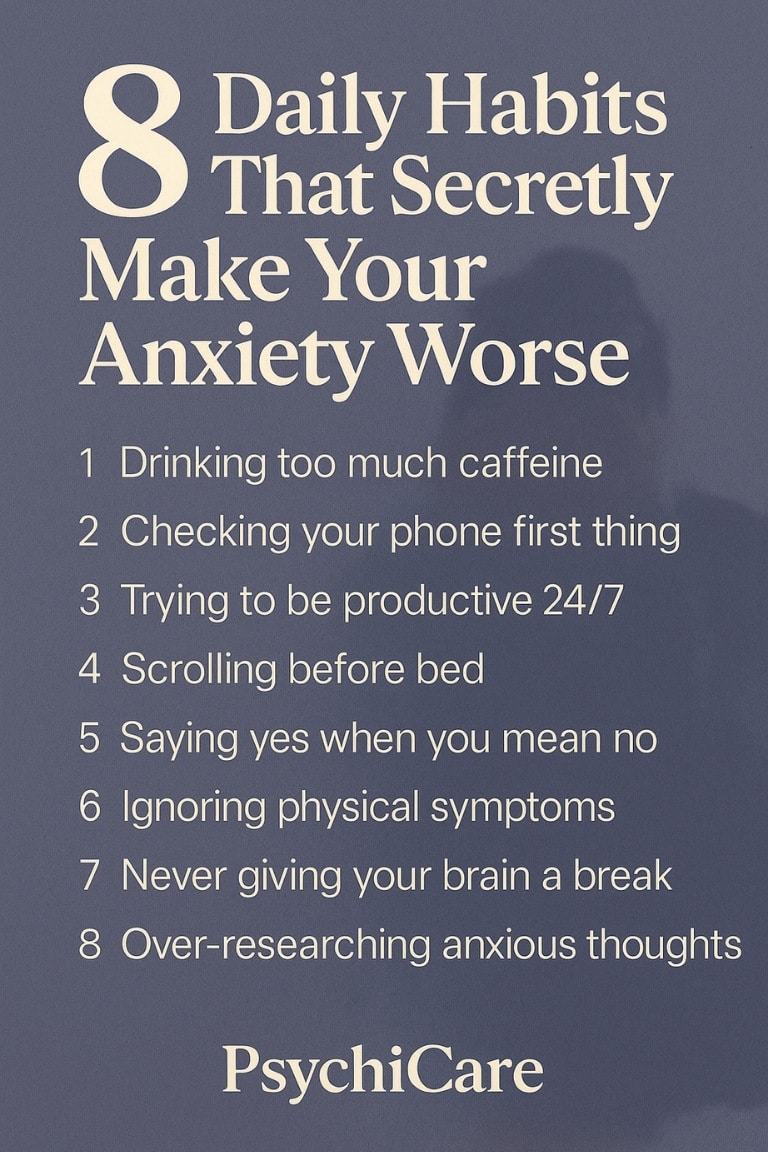
4. Scrolling before bed (then wondering why you can’t sleep)
Blue light, overstimulation, and comparison at night mess with your brain’s ability to wind down. It keeps your cortisol high, and your anxiety higher.
5. Saying yes when you want to say no
People-pleasing creates internal tension. Every time you betray your boundaries, your anxiety grows even if you don’t say it out loud.
6. Ignoring physical symptoms
That tight chest, nausea, or headache isn’t “just nothing.” Pushing through it without checking in on yourself is a form of emotional denial.
7. Never giving your brain a quiet moment
Podcasts during showers, music during walks, calls while eating if silence feels uncomfortable, your nervous system may be overstimulated.
8. Over-researching every anxious thought
Googling your symptoms, replaying conversations, or searching Reddit for answers can actually increase anxiety, not calm it.
Therapies Our Psychologists at PsychiCare Use to Treat Adult Anxiety
Anxiety looks different for everyone, which is why we don’t believe in one-size-fits-all therapy. At PsychiCare, our licensed psychologists match you with approaches that actually fit your symptoms, personality, and pace.
Here are some of the most effective therapies we use to treat adult anxiety:
1. Cognitive Behavioural Therapy (CBT)
One of the most research-backed methods. CBT helps you break the cycle of negative thoughts, panic loops, and unhelpful behaviour patterns that fuel anxiety.
When we use it: For general anxiety, overthinking, panic, and social anxiety.
2. Mindfulness-Based Therapy
You learn how to slow down racing thoughts, ground your body, and focus on the present. It’s especially helpful for those stuck in future-focused worry or constant tension.
When we use it: For high-functioning anxiety, sleep issues, and burnout.
3. Acceptance and Commitment Therapy (ACT)
Instead of trying to fight your anxious thoughts, ACT teaches you how to accept them without letting them control you, and commit to values-based actions.
When we use it: For chronic anxiety, emotional avoidance, and perfectionism.
4. Inner Child and Trauma-Informed Therapy
We help you explore how past experiences (especially from childhood or past relationships) may be linked to your current anxiety, then work on healing them at the root.
When we use it: When anxiety is linked to unresolved trauma or emotional neglect.
5. Exposure Therapy (Gentle, Not Forceful)
With full consent and pacing, we guide you through facing the things you avoid whether it’s public speaking, being alone, or specific social triggers.
When we use it: For phobias, panic attacks, and social anxiety.
6. Narrative Therapy & Self-Esteem Work
Anxiety often comes with harsh self-talk. This therapy helps you rewrite those inner stories and strengthen your sense of self.
When we use it: For anxiety tied to confidence, identity, or life transitions.
7. Couples & Family Therapy (If Needed)
Sometimes, anxiety is deeply linked to relationship dynamics. We help couples and families build safe communication and emotional support systems.
When we use it: For anxiety rooted in relationship conflict or adult separation anxiety.
8. Therapy in Your Own Language
Our therapists offer sessions in English, Hindi, Bengali, and Tamil so you can express your feelings comfortably without translation stress.
At PsychiCare, we don’t rush your healing or force a method on you. We start where you are and walk with you through what works.
Final Thoughts
Anxiety doesn’t always come with a label. It can look like overthinking, people-pleasing, irritability, or exhaustion. And for many adults, it goes untreated for years, because no one told them what it really is, or how much better life can feel with the right support.
At PsychiCare, we’ve helped thousands of adults understand and manage their anxiety, not with generic advice, but with personalised, evidence-based therapy that fits you.
Why Clients Trust PsychiCare:
- Licensed psychologists with advanced degrees and years of clinical experience
- Online sessions that fit your schedule, no travel, no waiting rooms
- Therapy in multiple languages (Hindi, English, Bengali, Tamil)
- Over 200+ five-star reviews from clients around the world
- Serving India, UAE, USA, UK, Singapore, Canada, Australia, and more
- 100% confidential, judgment-free environment
We’ve worked with working professionals, parents, college students, NRI clients, and even first-timers who thought therapy “wasn’t for them.” And the results speak for themselves: improved sleep, calmer minds, healthier relationships, and a sense of control they thought was lost.
FAQs on Adult Anxiety
Q1: What are the early signs of anxiety in adults?
Early signs of adult anxiety include constant overthinking, muscle tension, trouble sleeping, irritability, racing heart, and avoiding social situations without knowing why.
Q2: Can anxiety start later in life even if I was fine before?
Yes, anxiety can begin in adulthood due to triggers like trauma, job stress, parenting, or health issues. It’s common for symptoms to show up in your 20s, 30s, or even after 50.
Q3: What is adult separation anxiety disorder?
Adult separation anxiety involves intense fear or distress when away from loved ones. It can feel like panic, fear of loss, or needing constant reassurance from a partner, parent, or child.
Q4: How do I know if I have anxiety or just stress?
If your symptoms like racing thoughts, sleep issues, or avoidance, persist for weeks and interfere with daily life, it’s more likely anxiety than temporary stress.
Q5: Does adult ADHD cause anxiety?
Yes, many adults with ADHD also experience anxiety due to overwhelm, forgetfulness, and pressure to stay organized. ADHD and anxiety often co-exist and can worsen each other if untreated.
Q6: Can anxiety in adults be treated without medication?
Yes, adult anxiety can be managed through therapy, lifestyle changes, grounding tools, and stress-reduction techniques. CBT, mindfulness, and trauma therapy are highly effective without medication.
Q7: What type of therapy is best for adult anxiety?
Cognitive Behavioural Therapy (CBT) is one of the most effective therapies for adult anxiety. Other options include mindfulness therapy, ACT, and trauma-informed approaches, depending on your symptoms.
Q8: Is adult anxiety more common in women or men?
Anxiety is more commonly reported in women, but men often underreport due to stigma. Both genders experience anxiety, though symptoms may show up differently, emotional in women, physical in men.
Q9: How long does it take to feel better with therapy?
Many adults begin to notice changes within 4–6 sessions, especially with structured therapy like CBT. However, deeper anxiety or trauma may take longer depending on your personal pace and goals.
Q10: Can childhood trauma cause anxiety in adults?
Yes, unresolved childhood trauma is a major cause of adult anxiety. Emotional neglect, criticism, or feeling unsafe as a child can create long-term anxiety patterns in adulthood.
